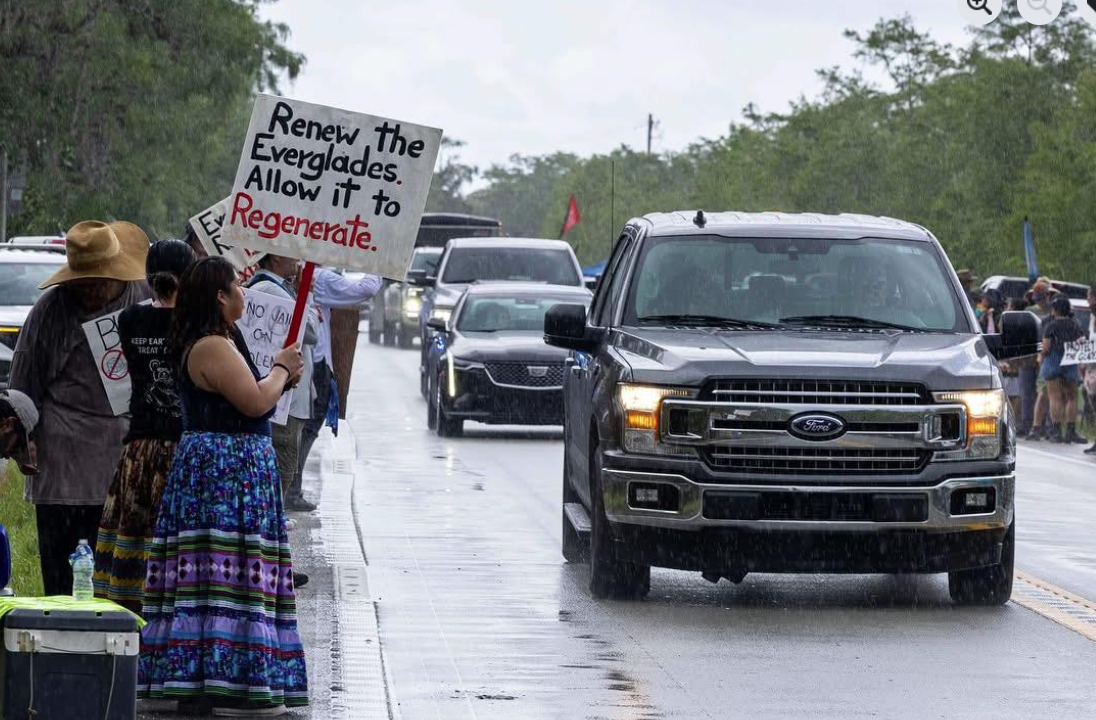
- Details
- By Elyse Wild
A federal appeals court has blocked a judge's order for the state of Florida and the Federal Government to shut down a temporary immigration detention facility located on the sacred and ancestral lands of the Miccosukee Tribe of Indians of Florida.
The detention center, widely called "Alligator Alcatraz," has been a lightning rod of controversy since it was proposed this summer. The move is the latest development in the ongoing legal battle over the makeshift detention center, which sits on a 39-square-mile abandoned airstrip in the Florida Everglades. The area is home to fifteen Miccosukee and Seminole villages. The facility has drawn criticism from lawmakers for its inhumane and unsanitary conditions.
Yesterday, the Eleventh US Circuit Court of Appeals granted requests from the State of Florida and the US Department of Homeland Security to stay a district court's preliminary injunction that would have forced the site to wind down operations within 60 days.
In July, the Miccosukee Tribe of Indians of Florida, together with Friends of the Everglades and the Center for Biological Diversity, filed suit against the state and federal government for failing to conduct required environmental reviews or obtain necessary permits prior to the construction, per the National Environmental Policy Act (NEPA).
Last month, the U.S. District Court for the Southern District of Florida issued a Temporary Restraining Order (TRO), halting further construction at the site. In yesterday's ruling, the judges pointed to the detention facility being operated by the state, not the federal government, therefore falling outside of NEPA stipulations.
The order read in part: "The Facility is a site built, led, operated, and funded unilaterally by a state government—in accordance with the state's laws—at which the state retains discretionary control over who is detained at the facility, all of which adds up to state control over the project's outcome, not federal control."
The sole dissenting judge argued that since the facility was requested by federal agencies and that DHS Secretary Kristi Noem and DeSantis publicly stated the federal government would fund it, its construction is subject to environmental review.
Despite the setback, the Miccosukee Tribe, allies and environmental groups remain steadfast.
"Going into this I knew it wasn't going to be easy," Osceola wrote in a text to Native News Online. "But the Everglades, the place that gave my ancestors refuge, a place we the Miccosukee call home is worth defending. Along with everyone else, I too will keep educating and advocating and doing what is necessary to help continue the fight to protect it.
I anticipated the Court may rule in favor of a stay of the preliminary injunction pertaining to Alligator Alcatraz and am prepared to dig in for the long haul.
My late mother used to say, 'As long as there is one, there is Hope.'"
More Stories Like This
Gwich'in Tribal Governments Submit Comments Challenging Fish and Wildlife Service's Inadequate Environmental Review of Arctic Refuge Snow RoadRappahannock Tribe Challenges 9M-Gallon Water Plan
Feds release draft long-term plans for Colorado River management
Apache Leader Walks 60 Miles to Court Hearing That Will Decide Fate of Sacred Oak Flat
Rappahannock Tribe Raises Sovereignty and Environmental Concerns Over Caroline County Water Permit
Help us defend tribal sovereignty.
At Native News Online, our mission is rooted in telling the stories that strengthen sovereignty and uplift Indigenous voices — not just at year’s end, but every single day.
Because of your generosity last year, we were able to keep our reporters on the ground in tribal communities, at national gatherings and in the halls of Congress — covering the issues that matter most to Indian Country: sovereignty, culture, education, health and economic opportunity.
That support sustained us through a tough year in 2025. Now, as we look to the year ahead, we need your help right now to ensure warrior journalism remains strong — reporting that defends tribal sovereignty, amplifies Native truth, and holds power accountable.
 The stakes couldn't be higher. Your support keeps Native voices heard, Native stories told and Native sovereignty defended.
The stakes couldn't be higher. Your support keeps Native voices heard, Native stories told and Native sovereignty defended.
Stand with Warrior Journalism today.
Levi Rickert (Potawatomi), Editor & Publisher


